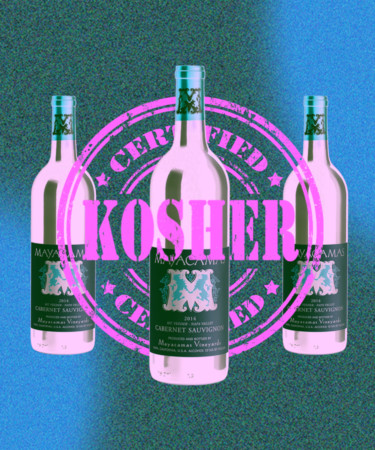Mayacamas: It’s a name most wine lovers know. Tucked in Napa Valley’s Mount Veeder AVA, the winery has been around since 1889 and has become one of the most well-regarded names in California and beyond — offering its big-budget bottles twice a year though an exclusive mailing list. Oenophiles around the world revere it, collect it, and age it for decades. But there’s a Mayacamas wine that even the brand’s biggest fans likely haven’t tried.
Mayacamas kosher Cabernet Sauvignon was launched in 2013, the same year that the Schottenstein family became partners in the winery — assuming full ownership just four years later. Hailing from Columbus, Ohio, the Schottenstein family is Orthodox Jewish. And since they keep kosher — adhering to Jewish dietary regulations that satisfy the requirements of Jewish law — they don’t actually drink the winery’s award-winning offerings.
But rather than miss out on the bounty at their fingertips, they decided to make a wine that they could drink — one that both satisfies the requirements of the kosher diet and tastes as delicious as any other Mayacamas offering.
Despite many misconceptions, kosher wines don’t have to be blessed by a rabbi. Instead, they must satisfy specific requirements to be considered kosher. First, the winery in which grapes are grown must meet certain agricultural criteria, such as abstaining from using grapes during the first three years of a vine’s life — a rule that’s inadvertently followed by almost every winery, kosher or otherwise. Kosher wines must also be made with kosher ingredients (including yeast, fining agents, and acid), and can only be handled and supervised by Sabbath-observing Jewish people.
With these rules in place, Mayacamas is making a kosher version of its famed Cabernet Sauvignon (the 2014 vintage ranked No. 1 on VinePair’s 2018 top 50 wines list). And the result is a striking upgrade from the usual offerings served with every Seder meal.
With notes of dark red fruits like cherries and cranberries, as well as cooking spices like cinnamon sticks and cloves, this wine is a delight and would please the palates of kosher-keeping and non-kosher wine drinkers alike. The 2017 vintage is still young and could be cellared for years (or decades), but it’s drinking well now and would be an ideal pairing with everything from brisket to — dare I say it — cheeseburgers.
If you’re lucky enough to get your hands on a bottle, Mayacamas Cab is proof that kosher wine has much more to offer than the grownup grape juice most Jewish folks are used to sipping with their matzah on Passover and challah on Shabbat. One sip, and you’ll likely never go back to Manischewitz.
